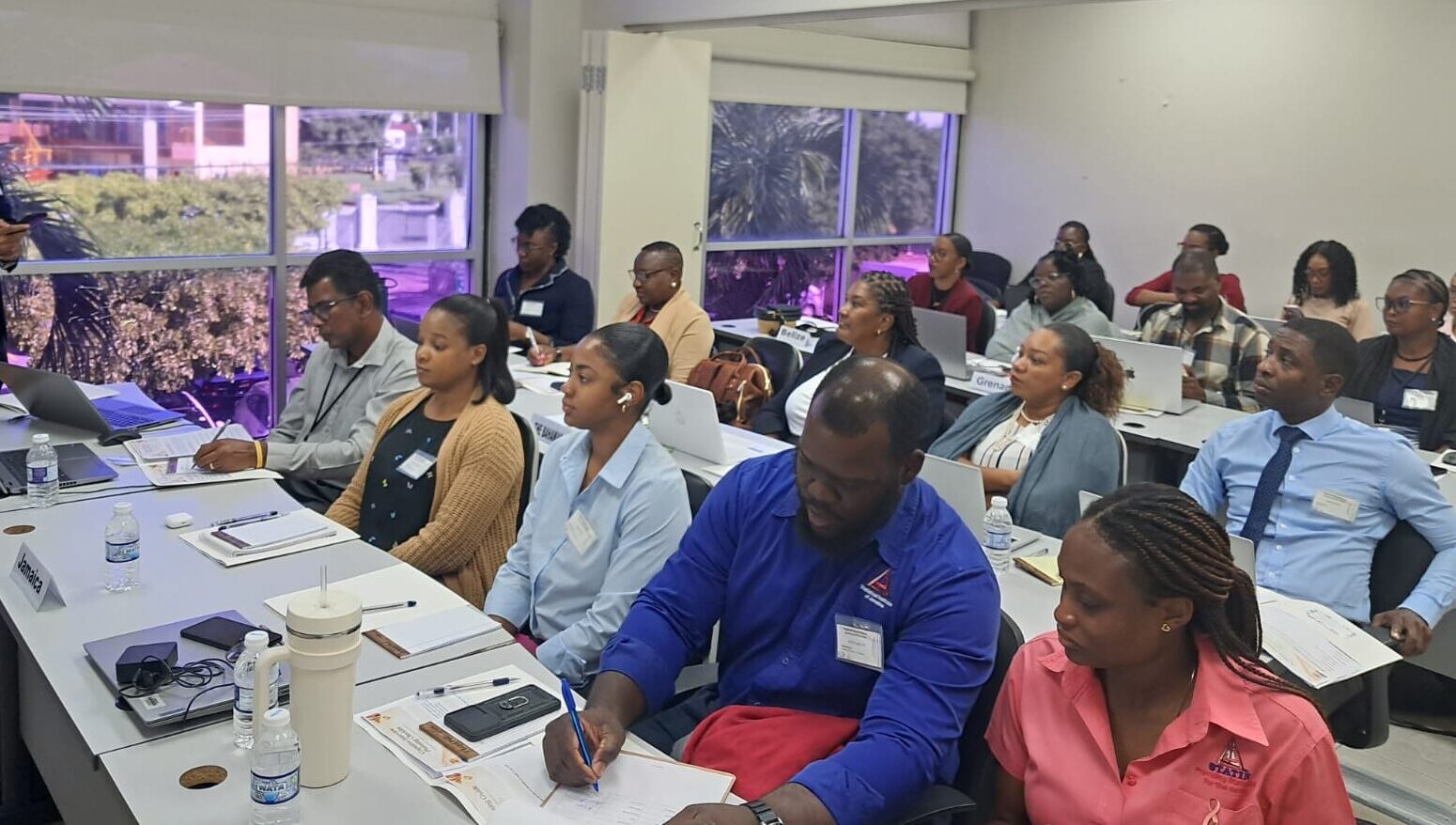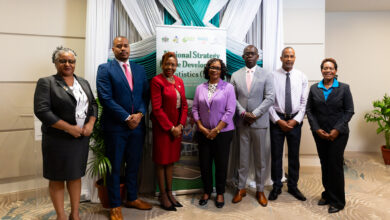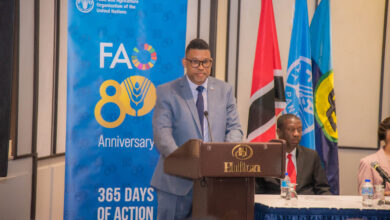As efforts continue to build the capacity of statistical offices in the Region, the CARICOM Secretariat has convened a workshop geared at designing high-quality questionnaires for household and business surveys.
The week-long training session, which is being held in Kingston, Jamaica, began on 6 October, and is funded by the European Union under the 11th European Development Fund Programme: Strengthening Framework for CARICOM Integration and Cooperation Process (11th EDF SFCICP). It is being held in collaboration with the Statistical Institute of Jamaica (STATIN).
During the training, representatives of national statistics offices will engage in hands-on exercises, cognitive testing simulations, and peer feedback sessions. Cynthia English, Mixed Methods Research Director, is leading the sessions.
Mr. Halim Brizan, Director, Regional Statistics Programme at the CARICOM Secretariat, delivered remarks at the opening of the workshop, pointing out that statisticians must develop different approaches in the face of evolving mindsets, attitudes, and behaviours of the Region’s populace, which he acknowledged “are vastly different from what they were a decade or two ago. The COVID-19 pandemic, in particular, has accelerated this shift in mindset.”
“This training is therefore both timely and highly relevant, as it seeks to enhance the design and administration of survey instruments—an essential step toward increasing the availability and quality of data to support evidence-based policymaking and sustainable development across the Region,” he said.
Please read his remarks:
It is indeed a great honour, on behalf of the CARICOM Secretariat, to welcome you to this training workshop on Questionnaire Design.
This workshop has been jointly designed by the CARICOM Secretariat and the Statistical Institute of Jamaica (STATIN) to equip staff of National Statistical Offices (NSOs) with advanced knowledge and practical skills in household survey questionnaire design, address existing gaps in technical expertise, and promote the harmonisation of practices across the Region.
I would like to acknowledge, in a very special way, the European Union, under the 11th European Development Fund (EDF) Programme for the Strengthening of the Framework of CARICOM Integration and Cooperation Process (SFCICP), for sponsoring this training. As some of you may know, the Regional Statistics Programme (RSP) of the CARICOM Secretariat is among the implementation units supported by this Programme. We have been benefiting immensely through initiatives aimed at improving the availability of high-quality and relevant statistics in both existing and emerging areas, and at enhancing the efficiency of statistical production, dissemination, and analysis. These efforts are essential for ensuring that data are available in a timely manner to support evidence-based policymaking, research, and the monitoring of progress towards national development priorities, regional integration, and global commitments, including the Sustainable Development Goals (SDGs).
I would also like to recognise our facilitator for this week, Ms. Cynthia English, Senior Research Consultant, who brings with her a wealth of knowledge and experience in survey design and management. Cynthia, we extend our sincere appreciation to you for graciously agreeing to lead this week’s training.
I wish to acknowledge the Director General of STATIN, Ms. Leesha Delatie-Budair and her team, for collaborating with us on this initiative and your generous support in hosting this event. STATIN must also be recognised as a valued partner in regional statistics development.
Despite ongoing efforts to strengthen statistical systems, National Statistical Offices (NSOs) across CARICOM continue to face challenges in sustaining the production of comprehensive, reliable, and comparable statistics. The limited implementation of regular household surveys in several Member States restricts the availability of detailed and timely information on key areas such as living conditions, health, income, employment, climate change, the environment, gender, and ICT, among others. This training is therefore both timely and highly relevant, as it seeks to enhance the design and administration of survey instruments—an essential step toward increasing the availability and quality of data to support evidence-based policymaking and sustainable development across the Region.
Reflecting on the rigorous 2020 Round of the Population and Housing Censuses, we can all agree that our current approach to census and survey implementation is no longer sustainable. Response rates and coverage levels have fallen short of what is required to produce reliable and timely statistics. It is therefore incumbent upon us, as statisticians, to adapt to the evolving mindset, attitudes, and behaviours of our populations, which are vastly different from what they were a decade or two ago. The COVID-19 pandemic, in particular, has accelerated this shift in mindset.
Several factors affected the overall quality of the 2020 census round, including lengthy questionnaires, negative public perception; amplified by the proliferation of social media, rising concerns about safety in crime-prone areas, the prevailing political climate, and challenges encountered with digital data collection technologies. While these issues posed significant challenges, they create opportunities for meaningful transformation. This is a call for us to be responsive to emerging trends in the survey environment that may threaten the sustainable production of our very own public good, official statistics.
Therefore, in this context, it is essential that NSOs understand the cognitive process involved in responding to surveys, the implications of the various modes of data collection, and the many factors that impact data quality and integration. It is also essential for us to be informed and to take advantage of new developments and improvements in the process of questionnaire design to improve our data collection instruments. This can lead to better quality data and higher response rates.
This training will therefore provide deep insights into the latest best practices in questionnaire design and support the development of robust survey instruments that ease the burden on both respondents and interviewers, while producing high-quality socioeconomic and environmental statistics. Beyond this intervention, we seek to build a cadre of regional trainers capable of replicating the training and sustaining capacity development over the long term.
A key motivator behind this training is the advancement of the CARICOM Regional Strategy for the Development of Statistics (RSDS) which was endorsed by the CARICOM Conference of Heads of Government in 2018. Under its strategic priority of Standards and Harmonisation, the RSDS promotes the alignment of national statistical production and dissemination practices with international and regional standards. Within this framework, targeted actions are being implemented to monitor progress and strengthen capacity, ensuring conformity with these standards, such as, through the ongoing revision of the United Nations Household Survey Handbook, aimed at enhancing statistical practices across Member States. This revision highlights the urgency of aligning CARICOM’s survey methodologies with evolving global statistical standards. As these methodologies advance, it is essential that National Statistical Offices (NSOs) are equipped with the requisite skills and tools to design and implement effective survey instruments.
Our initiatives under the 11th EDF have been guided by the Standing Committee of Caribbean Statisticians (SCCS)— the body comprising Directors of Statistics and Chief Statisticians across the Region—which meets annually to discuss and advance the Regional Statistics Work Programme. The SCCS, now celebrating its 51st anniversary since its establishment in 1974 by CARICOM, was created to foster increased recognition of the importance of adequate statistical services to Member States, to widen the scope and coverage of data collection, and to improve the quality, comparability, and timeliness of statistics produced. The declaration of a Year of Statistics in CARICOM on 4 November 2024 honours the SCCS’s five decades of achievement. We are therefore pleased to report that the activities undertaken and those forthcoming under the 11th EDF embody the theme of the Year of Statistics in CARICOM—‘Improving Lives through Statistics: Strengthening and Innovating Together’—and advance the mandate of the SCCS.
This workshop represents another step forward in advancing regional statistical capacity. Through our collective effort and dedication, we continue to strengthen the foundation upon which sound policy and sustainable development in CARICOM are built. I look forward to a productive and engaging week.






